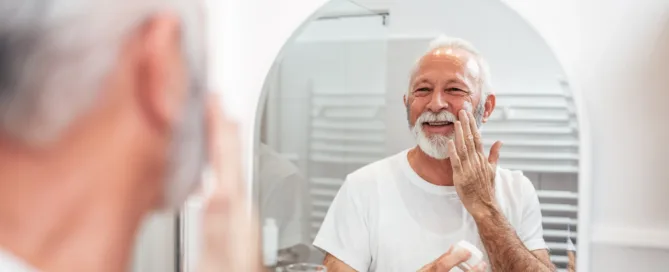Preventing Bedsores and Skin Irritation in Dementia Patients
As dementia progresses, individuals may lose the ability to communicate discomfort or the need for basic care. This makes it even more important for caregivers to be proactive in managing skin health. Skin care is a critical part of overall health and well-being for dementia patients, particularly for those who are bedridden or have limited mobility. Preventing bedsores (also known as pressure ulcers) and skin irritation is essential to ensure comfort and avoid further health complications.
This article provides practical strategies for dementia caregivers to prevent skin issues, including tips on hydration, proper positioning, the use of moisturizers, and more.
1. Why Skin Care Is Important for Dementia Patients
Dementia can impact the body’s ability to maintain basic health, and skin is often one of the most affected areas. Common skin issues that may arise in dementia patients include:
- Bedsores (pressure ulcers): These are painful sores that develop when prolonged pressure on the skin reduces blood flow to specific areas, especially over bony prominences like the hips, heels, and elbows.
- Dry skin: People with dementia may have difficulty expressing discomfort, but dry skin can cause itching, cracking, and irritation, which may lead to infections.
- Skin irritation or rashes: Incontinence, changes in hygiene habits, and medication side effects can all contribute to skin irritation or rashes in dementia patients.
- Bruising or cuts: As mobility declines, falls or accidents may result in cuts, bruising, or abrasions, which are harder for dementia patients to identify and address.
2. Preventing Bedsores (Pressure Ulcers)
Bedsores are a significant risk for individuals who are bedridden or have limited mobility. They typically form in areas where the skin is under pressure for extended periods, such as the back, hips, and heels. Preventing bedsores requires careful attention to positioning, skin care, and hygiene.
a. Positioning
Frequent repositioning is one of the most effective ways to prevent bedsores. By changing the patient’s position regularly, you can help relieve pressure on the skin, particularly over vulnerable areas.
Tips for proper positioning:
- Change positions every two hours: For bedridden patients, make sure to shift their position every two hours to relieve pressure on bony areas. This includes rotating them from side to side or adjusting their head, torso, and legs.
- Use pillows for support: Place pillows between the legs, under the arms, or behind the back to help maintain a comfortable position and reduce pressure on sensitive areas. For example, placing a pillow between the knees of a side-lying patient can help prevent pressure on the hips.
- Encourage mobility: If possible, help your loved one engage in physical activity or sit up in a chair for short periods. Even small movements can reduce the risk of bedsores.
b. Use Pressure-Relieving Devices
Specialized equipment can help reduce pressure and provide extra cushioning for the skin. Consider using pressure-relieving devices such as:
- Specialized mattresses or cushions: These devices are designed to redistribute pressure and reduce the risk of bedsores. Some mattresses inflate and deflate to adjust the pressure automatically, while cushions are available for wheelchair users.
- Heel protectors: For patients who are at risk of bedsores on their heels, heel protectors made of soft materials can provide extra padding and protect vulnerable areas.
3. Maintaining Moisture Balance: Hydration and Moisturizing
Keeping the skin hydrated is essential for maintaining its integrity and preventing dryness, cracking, and irritation.
a. Hydration
Dehydration can lead to dry, cracked skin, which is more prone to damage. Ensuring adequate fluid intake is an important part of skin care for dementia patients.
Tips for maintaining hydration:
- Encourage water intake: Offer water throughout the day, and provide options like herbal teas or water-based fruits (such as watermelon) to increase fluid intake.
- Monitor fluid output: Keep track of urine output and signs of dehydration (such as dark-colored urine or dry mouth). If dehydration is suspected, consult with a healthcare provider to adjust the patient’s fluid intake.
- Offer fluids in small amounts: If your loved one has trouble drinking large quantities, try offering smaller sips more frequently.
b. Moisturizing the Skin
Dry skin is common in dementia patients, particularly if they have trouble expressing discomfort or if they are on medications that cause dryness. Using moisturizers can help keep the skin soft and supple, reducing the risk of cracking and irritation.
Tips for moisturizing skin:
- Use gentle, fragrance-free moisturizers: Choose a moisturizing lotion or cream that is specifically designed for sensitive skin. Avoid products with strong fragrances or chemicals, as they may cause irritation.
- Moisturize after bathing: Apply moisturizer after a bath or shower when the skin is still damp, which helps lock in moisture.
- Focus on dry areas: Pay attention to commonly dry areas such as elbows, knees, hands, and feet. These areas are particularly prone to cracking and require extra care.
4. Managing Incontinence and Skin Irritation
Incontinence is a common issue for dementia patients and can lead to skin irritation or rashes if not managed properly. Prolonged exposure to urine or feces can cause the skin to break down, leading to discomfort and infections.
a. Prompt and Frequent Changes
Changing incontinence products promptly is key to preventing irritation and breakdown. Ensure that the patient is changed regularly to keep their skin clean and dry.
Tips for managing incontinence:
- Change diapers or pads regularly: Make sure to change your loved one’s incontinence products as soon as they become wet to prevent skin irritation.
- Use moisture-wicking products: Consider using moisture-wicking incontinence products that help keep the skin dry by drawing moisture away from the skin.
- Keep the skin clean: Use gentle, hypoallergenic wipes to clean the skin thoroughly after each change. Avoid products with alcohol or harsh chemicals that could irritate the skin.
b. Barrier Creams
Using a barrier cream or ointment can help protect the skin from the damaging effects of moisture. These creams create a protective layer on the skin that helps prevent irritation from urine or feces.
Tips for using barrier creams:
- Apply a thin layer: After cleaning, apply a thin layer of barrier cream to protect sensitive skin areas, particularly the buttocks and genital area.
- Choose gentle, non-irritating formulas: Look for barrier creams that are designed for sensitive skin and free from fragrances or harsh chemicals.
5. Regular Skin Checks
Frequent skin assessments are crucial for identifying potential issues early and addressing them before they become serious.
Tips for performing skin checks:
- Check for signs of redness or irritation: During regular positioning or bathing, check areas that are at risk for pressure sores, such as heels, elbows, and the lower back. Red or broken skin is a sign that pressure is starting to damage the tissue.
- Examine areas where moisture accumulates: Look for signs of skin irritation, particularly in skin folds, underarms, and groin areas, where moisture and friction can cause problems.
- Monitor for infection: Watch for signs of infection, such as swelling, pus, or increased redness, and seek medical attention if these symptoms appear.
6. When to Seek Professional Help
If you notice any signs of severe skin damage, such as open sores or persistent redness, or if your loved one’s skin issues are not improving despite your efforts, it’s important to consult a healthcare provider. A doctor, wound care specialist, or dermatologist can provide guidance on treating bedsores, managing skin irritation, and ensuring that your loved one’s skin health is properly supported.
Skin care for dementia patients requires proactive management to prevent bedsores, skin irritation, and discomfort. By maintaining a proper routine of hydration, moisturizing, positioning, and managing incontinence, caregivers can significantly reduce the risk of skin problems. With your attentive care and the right strategies, you can help prevent skin issues and improve your loved one’s overall well-being.




